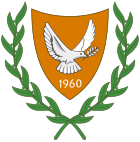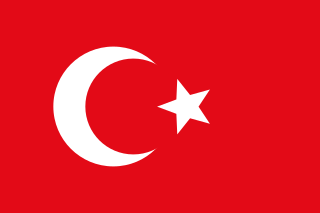 |
|---|

The Judiciary of Cyprus is the system of courts which interprets and applies the law in Cyprus. It is largely based on the English model. [1] Judicial independence is safeguarded by the Constitution.
 |
|---|

The Judiciary of Cyprus is the system of courts which interprets and applies the law in Cyprus. It is largely based on the English model. [1] Judicial independence is safeguarded by the Constitution.
The applicable laws in Cyprus are the Constitution, the laws of Article 188 in the Constitution, the Common Law and Equity and laws enabled by the Cyprus House of Representatives. After independence in 1960, Cyprus retained many colonial laws, integrating them with new laws enacted by its House of Representatives. These laws are guided by the principles of common law and equity, as outlined in the Constitution of the Republic of Cyprus and supplemented by European Union law after Cyprus's accession in 2004. [2]
Source: [3]
Cyprus's court system includes six District Courts, one for each district (Nicosia, Famagusta, Limassol, Larnaca, Paphos, and Kyrenia). Since the 1974 Turkish invasion, the Famagusta District Court temporarily resides in Paralimni, and the Kyrenia District Court in Nicosia. District Courts have jurisdiction over all civil disputes except those specifically assigned to the Rent Control Court, the Labor Disputes Court, and the Family Court. They also handle criminal cases with imprisonment penalties of up to five years.
The Assize Courts have unlimited jurisdiction over any criminal case, typically dealing with offenses punishable by more than five years of imprisonment. These courts are composed of a District Court President and two senior or regular District Judges, depending on the case.
Specialized courts, such as the Family Court, deal with divorce, custody, maintenance, and property disputes among Orthodox Christians, with separate courts for other religious groups. The Rent Control Court handles cases related to tenancy and rent issues, while the Labor Disputes Court exclusively deals with employment-related disputes.
The District Courts are courts of first instance for civil matters (except those which are dealt with by special courts such as the Family Court, the Rent Control Court, or the Industrial Disputes Court) and criminal cases involving prison sentences of five years or less. There are six such courts: Nicosia, Famagusta, Kyrenia (located in Nicosia), Larnaca, Limassol, and Paphos.

The Assize Courts are courts first instance for criminal cases which involve prison sentences of more than five years.
The Assize Courts consist of three judges with no jury and may be composed of either:
There are four such courts: Nicosia, Larnaca, Limassol, and Paphos.
The Supreme Court was established in 1964 from a merger of the Supreme Constitutional Court and the High Court. Although it can act as a court of first instance it is primarily an appeal court for both civil and criminal cases. As an appellate court the Supreme Court can review and re-examine all the evidence, request or admit other evidence and order cases to be reheard. It is composed of 13 judges, one of whom acts as the court president.
The Supreme Court also acts as a constitutional, admiralty and administrative court. It can also rule on electoral issues. It is based in Nicosia.
There are three Family Courts: one for Nicosia and Kyrenia, one for Limassol and Paphos and one for Larnaca and Famagusta which decide in divorce, child custody and real estate matters. There is also a family court for religious groups in Nicosia.
There are two Rent Control Courts which try cases of recovery of property, property rentals and associated matters.
There are three Industrial Disputes Tribunals, based in Nicosia, Larnaca and Limassol, which have jurisdiction over employment matters.
The Military Court has jurisdiction over military matters.
In May 2022, the Cypriot House of Representatives enacted Law 69(I)/2022, establishing the Commercial Court and Admiralty Court. This legislation introduces two specialized courts dedicated to resolving disputes in commercial and maritime law, respectively. [4]
Judges are members of the Judicial Service of the Republic. All judges, except those of the Supreme Court, are appointed by the Supreme Council of Judicature, a body composed of the judges of the Supreme Court, which is responsible for their appointment, promotion, transfer and discipline. Supreme Court Judges are appointed by the President of the Republic on the recommendation of the Supreme Court. [5]
There are 85 judges serving in all courts of first instance and 13 judges serving in the Supreme Court. They cannot be removed from office except under very exceptional circumstances. Supreme Court Judges retire at the age of 68, whereas those of all other courts retire at the age of 63.

The Eyalet of Cyprus was an eyalet (province) of the Ottoman Empire made up of the island of Cyprus, which was annexed into the Empire in 1571. The Ottomans changed the way they administered Cyprus multiple times. It was a sanjak (sub-province) of the Eyalet of the Archipelago from 1670 to 1703, and again from 1784 onwards; a fief of the Grand Vizier ; and again an eyalet for the short period from 1745 to 1748.

Cyprus Postal Services, or Cyprus Post, is the postal operator of Cyprus and operates the government-operated Post Office. A legacy of British colonial rule is the use of pillar boxes with the initials of the British monarch, although after independence they were painted yellow.

The judicial system of Turkey is defined by Articles 138 to 160 of the Constitution of Turkey.

The Catholic Church in Cyprus is part of the worldwide Catholic Church, under the spiritual leadership of the Pope in Rome.
Solon Nikitas was a distinguished Cypriot judge and jurist. Born in Limassol on 1.10.1937, where he lived his early years. His family then moved to Famagusta and he graduated from the Gymnasium of Famagusta with distinction and being awarded the Palamas Prize. Working for a short time at the Board of Commerce, he then went to England where he studied law and was called to the Bar (Lincoln's). From 1961 he practiced law in Nicosia. On 10.9.1971 he was appointed Judge of the District Court of Famagusta, subsequently serving at the District Court of Nicosia. On 10.10.1980 he was appointed Senior District Judge and on 1.1.1982 President of District Court, serving at the District Court of Nicosia and at the District Court of Larnaca-Famagusta. On 19.11.1988 he was appointed Judge of the Supreme Court. He left the Court on 30.4.2003, upon his appointment as Attorney-General. He resigned from that position in May 2005 in connection with a judgment of the Supreme Court, considering, as he stated in his announcement, that the case “is inextricably interwoven with the very essence of the administration of justice, the principles of the rule of law and the democratic principle of the separation of powers. It is also related to the existence, the endurance and the quality of institutions in a free and democratic society”.

Armenian Cypriots are the ethnic Armenian population native to Cyprus. The Armenian Cypriot community has had a significant impact upon the Armenian people as a whole despite its low numbers. During the Middle Ages, Cyprus had an extensive connection with the Armenian Kingdom of Cilicia, while the Ganchvor monastery had an important presence in Famagusta. During the Ottoman Era, the Virgin Mary church and the Magaravank were very prominent. Certain Armenian Cypriots were or are very prominent on a Panarmenian or international level and the survivors of the Armenian genocide have co-operated and co-existed peacefully with the Turkish Cypriots.

The Cyprus Police, is the national police service of the Republic of Cyprus, falling under the Ministry of Justice and Public Order since 1993.

KTFF 1. Lig, officially AKSA 1. Lig for sponsorship reasons, formerly known as İkinci Lig is the second-highest division of association football in Northern Cyprus. It is administered by the Cyprus Turkish Football Federation and has 16 clubs.
Prostitution in Cyprus is not illegal, but operating brothels, organising prostitution rings, living off the profits of prostitution, encouraging prostitution or forcing a person to engage in prostitution are illegal activities.
This page list topics related to Cyprus.
The Cyprus Ports Authority is a semi-autonomous government agency that is responsible for the supervision and oversight of the ports and port facilities of Cyprus. Established by the Cyprus Ports Authority Law of 1973, it is based in Nicosia.
The Cyprus Amateur Football Federation (CAFF) was founded in 1948 by leftist Greek Cypriot actors and athletes. The league, which divided Cypriot football into two federations for five years, held its own championships and cup competitions.

Parliamentary elections were held in Cyprus in 1960. The House of Representatives was elected on 31 July 1960. The Communal Chambers were also elected on 7 August. In the House of Representatives 35 seats were elected by Greek Cypriots and 15 by Turkish Cypriots. The result was a victory for the Patriotic Front, which won 30 of the 50 seats. In the Communal Chambers, the Patriotic Front won the majority of seats in the Greek Chamber, whilst the Cyprus Turkish National Union won all seats in the Turkish Chamber.

The law of Cyprus is a legal system which applies within the Republic of Cyprus. Although Cypriot law is extensively codified, it is still heavily based on English common law in the sense that the fundamental principle of precedent applies.

Christianity in Cyprus is the largest religion in the country, making up 78% of the island's population. The largest Christian denomination is the Greek Orthodox Church, while the rest are smaller communities of Anglicans, Roman Catholics, Latin Christians, Maronites, Armenian Apostolics, and Greek Evangelicals.

The Judiciary of Northern Cyprus is the system of courts which interprets and applies the law in Northern Cyprus. Judicial independence is safeguarded by the Constitution of the country.

Legislative elections were held in Cyprus on 6, 7 and 8 June 1883. They were the first elections to the newly established Legislative Council.

Legislative elections were held in Cyprus on 1 November 1886.

Legislative elections were held in Cyprus on 7 November 1891.

Legislative elections were held in Cyprus between 4 and 6 November 1896.